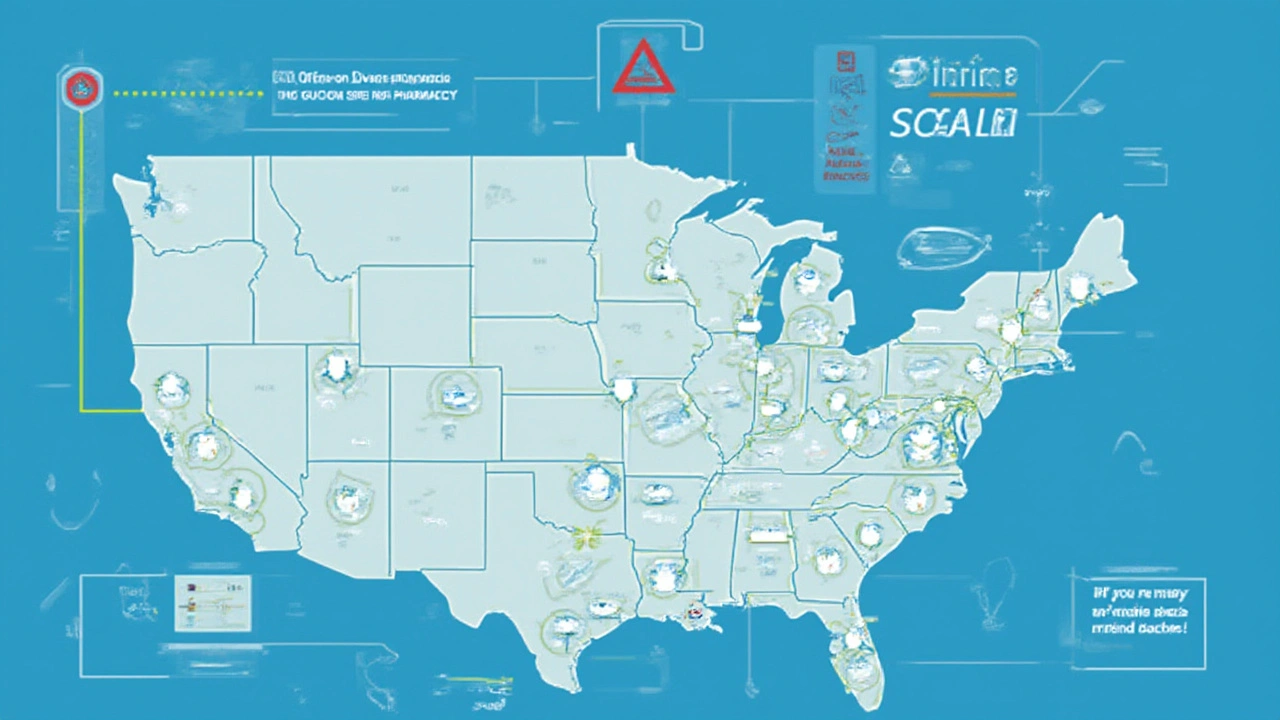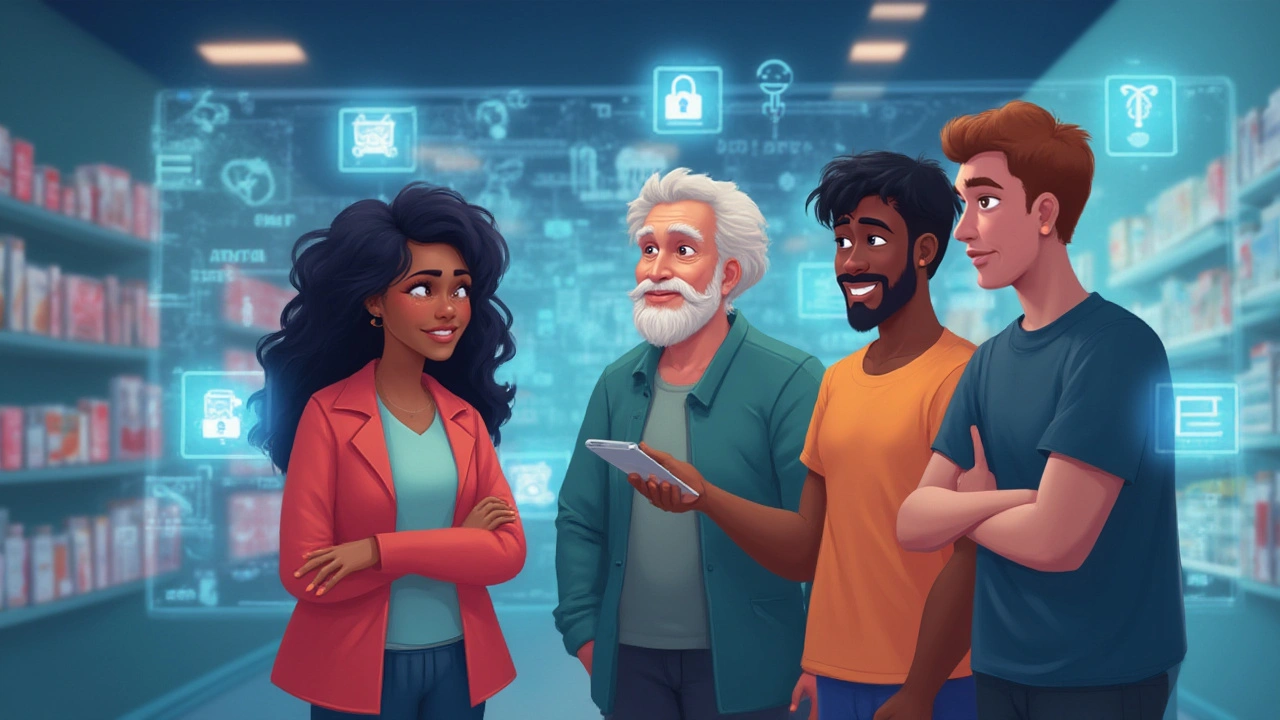If you’re tired of sticker-shock when picking up your meds, you’ve probably been tempted to check out one of those online pharmacies. rxconnected.com claims to cut your prescription costs, but can you actually trust it, or is it just another sketchy website with too-good-to-be-true deals? Let’s peel back the curtain, get into the nitty gritty, and see why so many people are searching for better ways to fill their prescriptions from home—while making sure nobody’s getting ripped off or risking their health in the process.
How rxconnected.com Works: What Sets It Apart (and What Doesn’t)
rxconnected.com isn’t hidden behind pop-ups or sketchy ads—it wants you to know exactly how it works. The process is pretty straightforward: you create an account, upload a valid prescription from your doctor, pick your meds, then check out and wait for delivery. It sounds almost suspiciously easy, but that’s the point: they're designed to mirror the convenience (and, more importantly, the regulations) of big-chain pharmacies. How does rxconnected.com actually source its medications? The company claims it leverages a network of 'approved international fulfillment centers.' To be more specific, their meds usually come from pharmacies in Canada, the UK, Australia, and New Zealand. This international angle is what lets rxconnected.com offer prices sometimes 50% lower than U.S. retail on brand-name drugs.
Is rxconnected.com a real, licensed pharmacy? Here’s a key fact: It doesn’t fill prescriptions itself. Instead, it functions as a licensed intermediary, connecting customers to verified pharmacies in countries with strong safety regulations. They’re accredited by the Canadian International Pharmacy Association (CIPA) and have a verified seal from PharmacyChecker—a third-party that checks pharmacies’ certifications and customer history. That might not sound thrilling, but it's the kind of boring, behind-the-scenes detail that separates legal, regulated online pharmacies from random, fly-by-night operations.
Even with all these checks, rxconnected.com won’t fill orders for controlled substances—don't expect to find Adderall or painkillers here. And every prescription is required to be valid and reviewed by licensed pharmacists. The honest reality? If someone’s selling you prescription meds and not requiring a prescription, run the other way.
Who’s Using RxConnected—and Why?
The truth is, most rxconnected.com customers aren’t trying to cut corners—they’re just everyday people who need life-saving medicine without going broke. American seniors with fixed incomes are some of the most common users, since U.S. pharmaceutical prices can be double or triple what’s charged in other Western countries. If you check out stories on forums or consumer advocacy websites, you’ll find parents getting insulin for their kids, chronic illness patients filling long-term scripts, and even recently uninsured folks trying to bridge a medical gap post-job loss.
RxConnected offers access to both brand-name and generic drugs, making it a no-brainer for people whose medications aren’t covered by insurance—or for those who fall into the ever-growing "donut hole" of Medicare Part D. A lot of customers start by double-checking the legitimacy of the service. You’ll notice hundreds of customer testimonials posted on CIPA’s website and Trustpilot. For reference, their Trustpilot rating usually hovers around 4.5 out of 5 over more than a thousand reviews, as of mid-2025. People consistently praise fast shipping (2-4 weeks standard for U.S. customers), accurate orders, and the significant savings—sometimes as much as $300 per month on a typical diabetes regimen.
Here’s a quick look at a few real examples of how much you might save:
| Medication | U.S. Brick & Mortar Average | rxconnected.com Price | Percent Savings |
|---|---|---|---|
| Jardiance (30 tabs, 25mg) | $650 | $175 | 73.1% |
| Ozempic (1 pen, 1mg) | $925 | $350 | 62.2% |
| Advair Diskus (60 doses) | $460 | $170 | 63.0% |
People also like that they can talk to real humans: rxconnected.com lists hours for live support calls, and their staff is known for walking new customers through the process without a hard sell.

Safety, Legality, and Quality Control: What You Need to Watch Out For
Not everything is roses in the world of online meds. The FDA has repeatedly warned consumers that most online pharmacies actually aren’t legit. In fact, a 2023 NBC News special revealed that roughly 95% of "online pharmacies" globally are noncompliant or downright illegal. So what’s the difference here?
Start with legal compliance. rxconnected.com displays its CIPA and PharmacyChecker seals visibly and links back to these third-party sites so you can confirm the accreditation. Being listed on CIPA means a pharmacy must only dispense medications with a valid prescription from a licensed physician, must protect patient privacy, and be transparent about where the drugs come from. For Americans, that’s crucial—U.S. law technically prohibits importing prescription drugs for personal use, but the FDA rarely interferes when someone is ordering a standard maintenance medication for up to 90 days and isn’t importing controlled substances. Thousands of Americans do it every year without legal trouble, but there’s always a small risk packages could be subject to delays, especially after major regulatory crackdowns.
What about the drugs themselves? One of the big worries people have is getting a counterfeit. RxConnected sidesteps a lot of risk by only working with government-licensed pharmacies in countries known for strict drug import controls. According to 2024 Health Canada statistics, the rate of counterfeit drugs found within its licensed pharmacy network was less than 0.03%, compared to more than 1.5% in unregulated online sources. For an extra peace of mind check, some customers have their meds tested by third-party labs—while reports are rare, the few that do exist tend to validate the drugs are the real deal with matching active ingredient levels.
If you ever get an order that looks off—wrong pills, broken seals, or suspicious packaging—contact support right away and do not take the meds until you get answers.
Ordering from RxConnected: Tips for a Smooth Experience
Ordering from an online pharmacy can sound intimidating at first, but rxconnected.com tries to keep it pretty user-friendly. Here are a few steps and tips based on customer experience and site navigation in July 2025:
- Create your account. Don’t skip setting up an online account. This lets you keep track of prescriptions, order status, and shipping details.
- Upload your prescription. Scan or snap a photo of your signed doctor’s prescription. If you can, get your prescriber to include a generic option (if that’s okay for you) since generics are usually even cheaper.
- Shop by drug name. The search tool is straightforward. Enter your drug’s name and dosing, then cross-check the price and country of origin before adding to your cart.
- Verify personal info. Pharmacies require your current contact details and (sometimes) a short health questionnaire, mainly to confirm safety interactions.
- Pick payment. Credit cards and international e-checks tend to clear the fastest. Crypto and prepaid cards are not accepted for legal reasons.
- Expect a wait. Medications are delivered by international tracked mail, but customs or postal slowdowns can add days or weeks. It's smart to order refills at least three weeks in advance.
- Keep documentation. Save order confirmations and shipping info in case customs or your doctor asks about your supply.
- Watch for follow-ups. RxConnected pharmacists may call or email if there’s any question about your prescription, allergies, or drug interactions.
It’s also worth mentioning: You can’t use U.S. insurance to pay here, so be prepared to pay out-of-pocket—though in most cases, the savings outweigh the lack of insurance coverage. Orders over a certain amount (it varies, but it’s usually $100 or more) often qualify for free shipping promos. And first-time buyers can sometimes get bonus coupons, so check the site or ask customer service for codes.

Common Concerns and How to Handle Them
Let’s be real, people get worried about three things when dealing with online pharmacies: privacy, safety, and the “what if something goes wrong?” scenario. For privacy, rxconnected.com says it uses industry-standard SSL encryption for its website and keeps medical files on secure servers located in Canada. They’re bound to international privacy standards (like Canada’s PIPEDA law), which are stricter than U.S. HIPAA in some cases.
What happens if your package gets lost or stuck in customs? About 2-4% of packages get delayed, but very few get seized outright. In almost every customer report, rxconnected.com either reships the order at no charge or offers a refund if the meds don’t arrive in the promised window. Read their policies closely, since customs events can stretch the clock. If the wrong drug is shipped, submit a photo and order number—they typically resolve it without hassle.
Can you talk to your real-life doctor about this? Many U.S. physicians are aware of international pharmacy options and will write a script without judgment, especially for chronic conditions. Just be upfront with your doctor about where you’re filling the prescription, since the drugs may look different or have different branding/node numbers due to country-specific packaging.
Is it safe to reorder and rely on rxconnected.com long-term? Most long-term users stick with them for years after trying the process once. They watch for changes in regulations that could interrupt future orders and always have a back-up plan (like a local pharmacy) if a package gets delayed. Watch rxconnected.com’s emails for shipping updates or changes in their pharmacy partners—these can sometimes mean a better deal or a switch to a higher quality supplier.
If you ever see a "too good to be true" deal online—like $5 Viagra or painkillers promising "no prescription required”—that’s a massive red flag. Stick with a service that’s boringly regulated and upfront, even if it means paying a few dollars more for the peace of mind.

Jacob Keil
August 1, 2025 AT 03:50so like… if the fda says its illegal but they dont do anything about it… is it still illegal or just a suggestion? like when you park in a no parking zone but the cop is on his phone and you just… exist there? that’s the vibe. i dont care if its ‘regulated’ if the law says dont do it. but also… insulin costs 300 bucks here and 80 there? im not a saint i’m a human with diabetes. so yeah. i ordered. let me know if the feds knock.
Rosy Wilkens
August 2, 2025 AT 14:54Let me be perfectly clear: this entire operation is a Trojan horse for pharmaceutical cartels to offload expired, unregulated, and possibly counterfeit medications onto vulnerable Americans under the guise of ‘affordability.’ CIPA? PharmacyChecker? These are not government agencies-they are profit-driven middlemen with corporate sponsors. Did you know that Canada’s drug pricing system is subsidized by their national healthcare? We’re importing the byproduct of their socialist system while they quietly laugh at our broken market. And don’t get me started on how these ‘trusted’ pharmacies are often owned by the same multinational conglomerates that price-gouge us domestically. This isn’t salvation-it’s systemic exploitation dressed in a lab coat.
Andrea Jones
August 2, 2025 AT 18:30Okay but like… have you actually tried it? I ordered my Jardiance last month and it arrived in 18 days with a little thank-you note in French (??). The pills looked exactly like the ones from my local CVS, just without the $600 price tag. I cried when I saw the receipt. My pharmacist didn’t even blink when I told her where I got it-she just said, ‘Good for you. I wish I could afford that.’ So yeah, it’s weird. But also… kind of beautiful? Like, we’re all just trying not to die broke. And if Canada’s got better pricing and better oversight, why are we pretending this is a moral dilemma instead of a policy failure?
Justina Maynard
August 4, 2025 AT 13:59Let’s not romanticize this. The fact that you need to rely on international pharmacies to survive is a catastrophic indictment of U.S. healthcare policy. But the real issue isn’t whether rxconnected.com is ‘safe’-it’s that your life is being held hostage by a system that commodifies insulin like it’s a luxury good. The packaging may be pristine, the pharmacists may be licensed, but the underlying truth remains: you shouldn’t have to gamble your health on a website because your insurance denies coverage or your deductible is $10,000. This isn’t clever consumerism-it’s survival hacking in a broken world. And the fact that you’re proud of finding a loophole? That’s the real tragedy.
Evelyn Salazar Garcia
August 5, 2025 AT 21:50Foreign meds. No thanks. America first. Also, I don’t trust anyone who buys drugs online.
Clay Johnson
August 7, 2025 AT 12:26The regulatory architecture is sound if you accept the premise that national borders are arbitrary in pharmaceutical supply chains. The FDA’s non-enforcement is de facto policy. The savings are mathematically undeniable. The risk is statistically negligible compared to the alternative of financial ruin or medical noncompliance. The moral panic is performative. The real crime is the domestic pricing model. Everything else is noise.
Jermaine Jordan
August 9, 2025 AT 08:53THIS IS THE FUTURE. Imagine a world where your life-saving medication doesn’t cost a month’s rent. Where you don’t have to choose between food and your insulin. Where a website with a CIPA seal becomes your lifeline-not a scandal. This isn’t shady. This is justice. This is people taking back power from greedy corporations that treat human beings like balance sheets. If you’re not cheering for this, you’re not paying attention. Millions are surviving because of this. Millions. And the people who call it ‘illegal’? They’re not the ones gasping for air because they skipped a dose to pay rent. This is revolution. Quiet. Necessary. Beautiful.
Chetan Chauhan
August 10, 2025 AT 15:34you all missing the point. canada pharmacy? what if they just resell us american drugs that got rejected for packaging defects? i saw a video once where someone opened a box and the pill was half the size. and why is the website in english if its canadian? its all fake. also i ordered viagra once from a site like this and got toothpaste. so no. dont trust. maybe its legit but maybe its not. why risk it when you can just… not take the meds? just sayin.